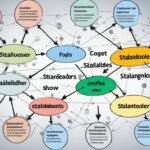Table of Contents
A cognitive bias is a systematic error in thinking that occurs when people are processing and interpreting information in the world around them. It affects the decisions and judgments that they make. Cognitive biases are often a result of the brain’s attempt to simplify information processing and make decisions quickly. Biases can be related to memory, attention, and other mental processes. The concept of cognitive bias was introduced by researchers Amos Tversky and Daniel Kahneman in 1972. Since then, researchers have described a wide range of biases that affect decision-making in various areas such as social behaviour, cognition, and economics.
Cognitive biases can have a significant impact on our decision-making, problem-solving abilities, career success, memory reliability, response to crisis, and overall well-being. However, by understanding and addressing cognitive biases, we can make better judgments and lead more fulfilling lives.
Common Types of Cognitive Biases
When it comes to understanding cognitive biases, it is essential to familiarize ourselves with the common types that can significantly impact our thinking and decision-making. By recognizing these biases, we can work towards making more objective judgments. Let’s explore some of the most prevalent cognitive biases:
- The actor-observer bias occurs when we attribute our actions to external causes while attributing the actions of others to internal causes. This bias often leads to a skewed perception of responsibility and can affect our relationships and interactions.
- The anchoring bias refers to our tendency to rely too heavily on the first piece of information we receive. This bias can restrict our ability to consider alternative perspectives and leads us to give excessive importance to initial data.
- With attentional bias, we tend to focus on certain things while neglecting others. This bias shapes our perception of reality and influences the information we pay attention to, impacting our decision-making process.
- Confirmation bias is the inclination to favor information that confirms our existing beliefs while dismissing contradictory evidence. This bias can hinder critical thinking and prevent us from considering alternative viewpoints.
- The false consensus effect leads us to overestimate how much others agree with our opinions, values, or behaviors. This bias can create a distorted sense of social norms and influence our decision-making based on incorrect assumptions.
Understanding and recognizing these common cognitive biases is crucial for making informed decisions and avoiding potential pitfalls. Let’s take a closer look at how these biases can impact our lives and explore strategies to mitigate their effects.
More Types of Cognitive Biases
In addition to the common types of cognitive biases discussed earlier, there are several more that can significantly impact our thinking and decision-making processes. These biases can influence how we perceive and interpret information, leading to potential errors in judgment and decision-making.
The Availability Heuristic
The availability heuristic is a cognitive bias that causes individuals to place greater value on information that is easily recalled or readily available in their memory. It leads us to rely on examples or instances that come to mind most easily when making judgments or decisions. This bias can lead to inaccurate assessments of likelihood or probability, as the ease of recall does not necessarily indicate the actual frequency or prevalence of an event or outcome.
Functional Fixedness
Functional fixedness is a cognitive bias that limits our ability to see alternative uses for objects or people based on their usual functions. It prevents us from thinking creatively and restricts our problem-solving abilities. This bias can hinder innovation and prevent us from finding novel solutions to challenges or tasks.
The Halo Effect
The halo effect is a cognitive bias that occurs when our overall impression of a person influences our perceptions and evaluations of their specific traits or characteristics. It can lead to biased judgments and favoritism based on initial impressions, preventing us from making objective assessments of an individual’s abilities or qualities.
The Misinformation Effect
The misinformation effect is a cognitive bias that occurs when post-event information interferes with our memory of the original event. This bias can lead to distorted recollections and inaccurate memories, as new information can override or alter our original impressions or perceptions.
Optimism Bias
Optimism bias is a cognitive bias that causes individuals to believe that they are less likely to experience misfortune and more likely to achieve success than others. It leads to overconfidence and excessive risk-taking, as individuals underestimate potential risks and overestimate their own abilities. This bias can have significant implications for decision-making and can result in poor judgment or unrealistic expectations.
Self-Serving Bias
The self-serving bias is a cognitive bias that involves attributing our successes to internal factors and blaming external factors for our failures. It allows individuals to protect their self-esteem and maintain a positive self-image, even in the face of adversity. This bias can impact our ability to take responsibility for our actions and can influence how we interpret and respond to feedback or criticism.
Understanding these additional cognitive biases is crucial for recognizing and challenging our own thought processes and decision-making tendencies. By being aware of these biases, we can make more informed judgments and better navigate the complexities of our cognitive processes.
| Cognitive Bias | Description |
|---|---|
| Availability Heuristic | Placing greater value on easily recalled information |
| Functional Fixedness | Tendency to see objects or people in limited ways based on their usual functions |
| Halo Effect | Influencing perceptions based on overall impressions |
| Misinformation Effect | Interference of post-event information with original memory |
| Optimism Bias | Belief in decreased likelihood of misfortune and increased likelihood of success |
| Self-Serving Bias | Attributing successes to internal factors and failures to external factors |
Impact of Cognitive Bias and Strategies to Mitigate It
Cognitive biases can have a significant impact on our decision-making, problem-solving abilities, career success, memory reliability, response to crisis, and overall well-being. The influence of cognitive bias is pervasive and can lead to errors and distortions in our thinking. However, there are strategies that can help mitigate the effects of cognitive bias and improve our decision-making processes.
The first step in mitigating cognitive bias is to be aware of its existence and how it can influence our thinking. By recognizing the presence of bias, we can actively work towards minimizing its impact on our judgments and choices. It is important to consider the various factors that can influence our decisions, such as emotions, personal experiences, and social influences. By being mindful of these factors, we can take a more objective approach to decision-making.
Actively challenging our biases is another effective strategy. This involves questioning our assumptions, seeking alternative perspectives, and looking for evidence that contradicts our initial beliefs. By actively challenging our biases, we can broaden our thinking and make more rational and informed decisions.
In addition, cognitive training has shown promise in reducing the effects of cognitive bias. Cognitive training programs are designed to improve cognitive abilities, such as attention, memory, and problem-solving skills. By enhancing these cognitive processes, individuals may become more resistant to the influence of biases and make more accurate decisions.
Furthermore, reducing cognitive bias through therapy can be beneficial, particularly for individuals with certain mental health conditions. Therapeutic interventions, such as cognitive-behavioral therapy, aim to identify and modify maladaptive cognitive biases that contribute to distress and dysfunction. By addressing and challenging these biases, individuals can develop healthier thinking patterns and improve their overall well-being.
By understanding and addressing cognitive biases, we can enhance our decision-making abilities, make more accurate judgments, and lead more fulfilling lives. Implementing strategies to mitigate cognitive bias empowers us to think critically, objectively, and consciously, ultimately enabling us to make better choices in various aspects of life.
FAQ
What is cognitive bias?
Cognitive bias refers to a systematic error in thinking that occurs when processing and interpreting information, leading to distorted decisions and judgments.
Who introduced the concept of cognitive bias?
The concept of cognitive bias was introduced by researchers Amos Tversky and Daniel Kahneman in 1972.
What are some common types of cognitive biases?
Common types of cognitive biases include actor-observer bias, anchoring bias, attentional bias, confirmation bias, and false consensus effect.
What is the impact of cognitive bias?
Cognitive bias can affect decision-making, problem-solving abilities, memory reliability, career success, response to crisis, and overall well-being.
How can cognitive bias be mitigated?
Strategies to mitigate cognitive bias include awareness of bias, challenging our biases, cognitive training, and therapy for certain mental health conditions.







